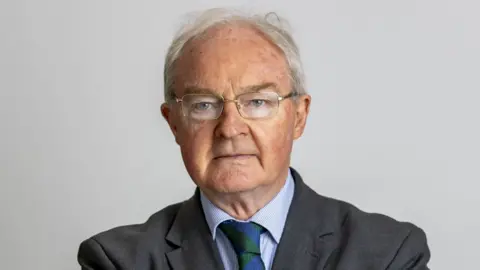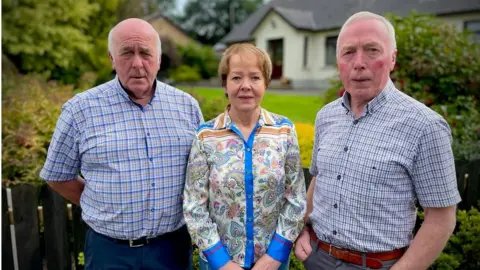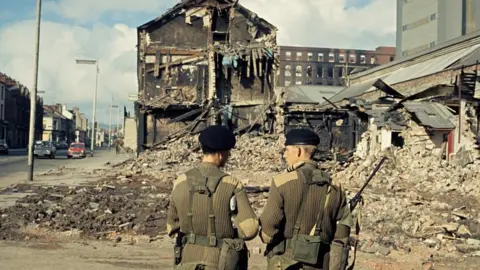What is the Northern Ireland Legacy Bill?
 PA Media
PA MediaThe government's Legacy Bill has been controversial because opponents say it will remove access to justice for victims and relatives of those affected by the Troubles in Northern Ireland.
The government says it is an attempt to draw a line under the events of the past.
So what is in the bill?
First things first - a bill is a proposed law. This one has been approved by both Houses of Parliament (the Commons and the Lords) and it is on its way to becoming law within the next few months.
The Northern Ireland Troubles (Legacy and Reconciliation) Bill runs to almost 100 pages.
It would stop new Troubles-era cases and inquests from starting, and offer a conditional amnesty to those accused of killings. If implemented, the law would apply to former members of the security forces and to ex-paramilitaries.
More than 1,000 killings from the Troubles have never been solved.
What is a conditional amnesty?
An amnesty is immunity from prosecution. This bill will allow that for anyone who co-operates with investigations run by a new recovery body - the Independent Commission for Reconciliation and Information Recovery (ICRIR).
The ICRIR will have a £250m budget and a staff of several hundred. It will be led by retired judge, Sir Declan Morgan and will run for five years.
 PA Media
PA MediaUnder the plans, people accused of killings won't be prosecuted if they speak to the investigation and make their knowledge public.
This is the part that has proven controversial with victims' groups.
The plan to prioritise truth recovery is inspired by the South African Truth and Reconciliation Commission (TRC), set up by Nelson Mandela after that country's conflict.
It is a model that is often held up as a good way for societies to emerge from conflict - but it had its own critics and crucially, it was set up immediately after the conflict while memories were still fresh.
Who is opposed to the NI Legacy Bill and why?
Northern Ireland Victims' Commissioner Ian Jeffers has said: "We would love to see the bill withdrawn, it is as simple as that".
Groups representing bereaved families and victims of the Troubles oppose it.
One such group - Relatives for Justice - has said if made law, it would "remove all rights and access to justice" and called it "anti-victim, anti-human rights and anti-rule of law".
Another - Wave Trauma Centre - said many victims feel it is "more about protecting perpetrators rather than achieving truth, justice and acknowledgement for victims and survivors".
One bereaved son, Jim McKearney, whose parents were killed in 1975, told BBC News NI that if Prime Minister Rishi Sunak "stood where I stood he would have a different view and if he thinks we can just draw a line under what happened, we can't".

The legislation is also opposed by all Northern Ireland political parties and by the Irish government.
DUP MP Jim Shannon cried in the House of Commons when speaking of the murder of his cousin and a friend in 1971, saying: "Our pain is still here, our pain is still raw and our people grieve and my constituents grieve, and really you say they're going to have justice?
"We can't see justice, we don't see it."
Who supports the NI Legacy Bill?
The legislation is supported by veterans' groups. Veterans Commissioner Danny Kinahan gave the bill a cautious welcome and it is also supported by the Northern Ireland Veterans Movement - a group which represents 200,000 Army veterans.
Some other military veterans have criticised it.
The topic of dealing with the past has been a political issue for a long time in Northern Ireland, but has been brought into the main news headlines recently as a soldier has been in court charged with murdering two people in 1972.
The man, known only as Soldier F, is accused of killing the men during what became known as Bloody Sunday, when the Army's Parachute Regiment opened fire on a civil rights march in Londonderry.

What have the government said about the Legacy Bill?
Two Northern Ireland secretaries have commented on the Legacy Bill so far.
Brandon Lewis said the legislation would "give people a reason to come forward and a motivation to come forward that at the moment simply doesn't exist".
Current Secretary of State Chris Heaton-Harris said: "This is never going to be a perfect solution to this particular problem because no perfect solution exists."
He said that the government believed it was "the best mechanism by which we can generate the greatest volume of information in the quickest possible time to pass on to families and victims".
